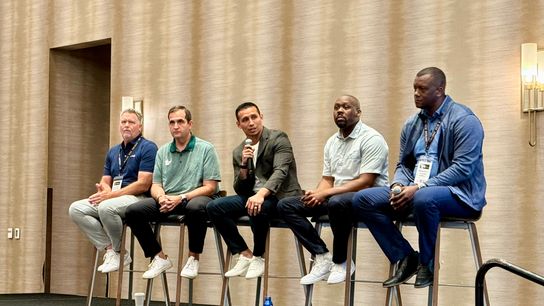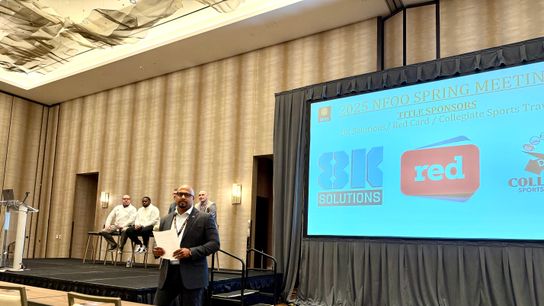FRISCO, Texas -- With U.S. District Court Judge Claudia Wilken again recently signaling her intent to formally ratify the House Settlement, pending modifications to the roster-limit agreements within the deal, there's an impending trickle-down effect for the NCAA's member institutions.
A number of those topics -- financial literacy for student-athletes is a big one -- are being examined for potential changes moving forward, FootballScoop has learned on the heels of last week's National Football Operations Organization meetings at Dallas Cowboys headquarters.
Two topics -- going to a single NCAA Transfer Portal Window and when it would occur -- as well as a certification process also in partnership with the NCAA for the agents representing collegiate student-athletes are at the forefront.
"We have no certification process whatsoever for agents in college repping these NIL kids," one prominent speaker tells the crowd of hundreds of football operations directors from across all levels of college football and even some high school representation. "You've got some (agents) getting as much as 25% of the deals.
"If someone tells a kid he can double his money elsewhere, they’re gone."
The super-majority of DFOs in the room for the panel meetings agree almost unanimously in favor of an NCAA program moving forward to mandate representatives of student-athletes at the college level go through a certification process with the NCAA.
As one NCAA representative notes, the NFL requires its player-agents to be certified with the league.
"But the NFL has collective bargaining," notes another.

Panelists from the NCAA, numerous third parties, agents and top school leaders are among those addressing college football's operations leaders during the annual NFOO meetings. (Photo credit: John Brice/FootballScoop).
Still, representatives on hand indicate a willingness to explore the NCAA agent-certification theory and advance the topic in the coming months.
"We [the NCAA] created an agent certification program in 2019 regarding men’s basketball student-athletes," the crowd is reminded. "Agents boycotted at first and now everyone is in that certification.
"We need you all to talk to head coaches, to talk to state officials. Go to your local officials and head coaches and tell them you want certification [for college football student-athlete representation]. I think there’s an appetite for that."
A nebulous marketplace in that regard, the crowd learns, is only growing.
"There's a 45% increase in agent activities this year in terms of student-athletes in the Portal with agents," another expert panelist shares with the crowd. "[The mindset is] like, 'I gotta have an agent to do my dirty work.'
"We (at the NCAA) saw agents sending out lists to staff before the season even ended. A lot of the tampering is coming from that area. ...
"Agents are dictating this market."
With experience in the SEC and now serving as Alex Golesh's general manager at South Florida, Andrew Warsaw is working to develop a curriculum for a three-hour academic course for USF student-athletes to learn all facets of "financial literacy" in this era of pay-for-play and impending revenue-sharing.
The agent influence, as well as the lack of guardrails/rules, impact the NCAA Transfer Portal.
For several months, discussions have been emerging on streamlining into a single Portal period, a year after seeing the two windows decrease in calendar time from 45 total days down to 30 across the two periods. There's virtually unanimous approval in the room for a single Portal window.
While opinions vary on when is the most equitable time to hold a single, open NCAA Transfer Portal Window (graduate-transfer rules would not be impacted), there is some growing momentum for a late-spring window, though as one person notes and gets several assenting voices, "I like the January window because I don’t want to spend time training and producing all spring, just to have a player leave."
"I like the (proposal) for a late-April or May window," says a Power Conference DFO. "But what about the calendar for spring football?"
Indeed, the calendar for spring football -- much like the windows for the Transfer Portal -- is being examined for change.
"If you're expanding the (College Football) Playoff again, which is being discussed," an NCAA official asks, "are you then getting into February?"
"There are conversations about changing the spring format," he says. "A certain number of practices to be allowed over a certain timeframe. [In one model] you could have them in April, May and June."
That potential format is again more of the NFL's OTA model (organized team activities) and does include the potential for more allowable hours in those months.
A late-spring window also is seen as having potential ancillary benefits for programs in transition.
"Now, there's more time to get academics in order," the panelist says. "If you're a new coach, you've got more time to see players you may inherit and kids frankly you may or may not want. Now, that player doesn’t have to say, 'My head coach is gone, I'm going straight into the Portal. And I don’t know who the hell they hired.' If I'm a new coach, I can see who’s on my team.
"Would that have helped you (Power Conference DFO) to have had a later time to evaluate kids you inherited?"
"Yes," is the reply.
FootballScoop will continue its comprehensive coverage from the NFOO meetings this week, with additional writing and a new FootballScoop podcast to follow in the coming days.
